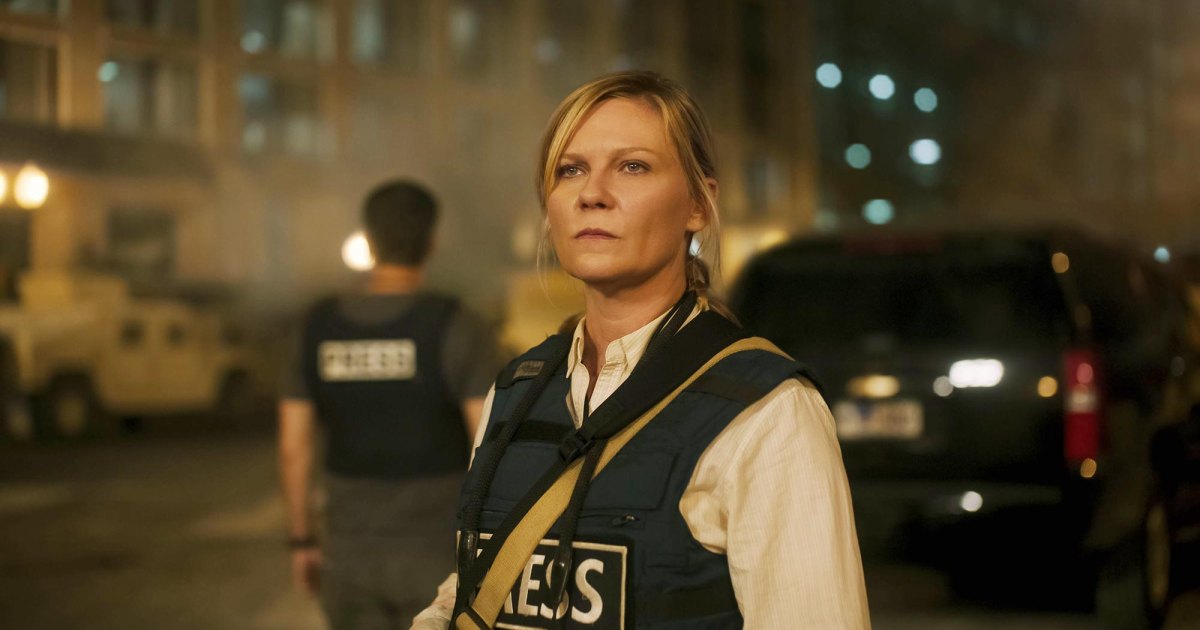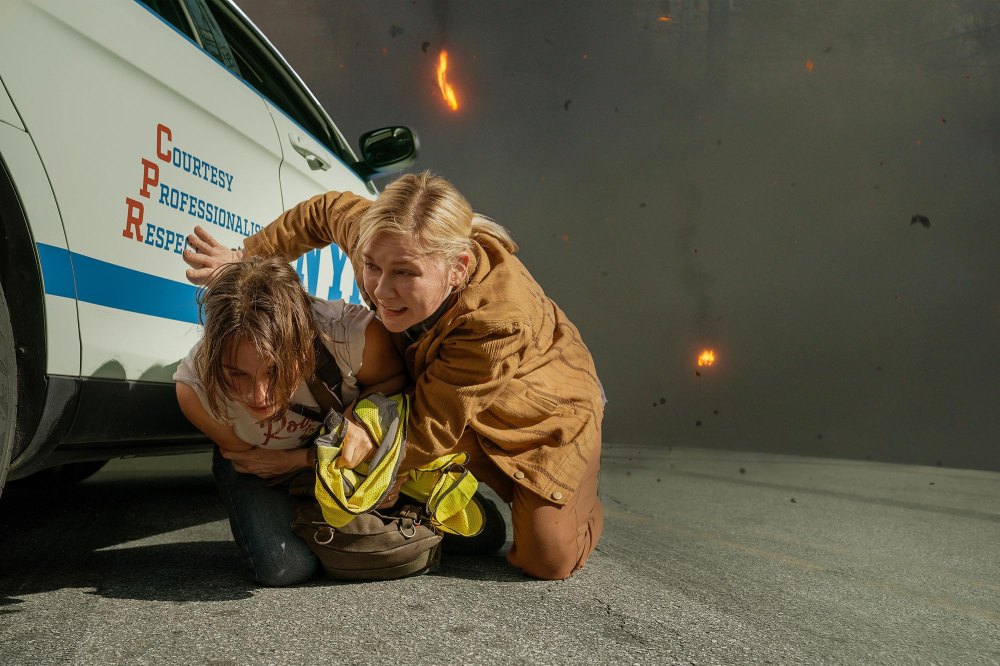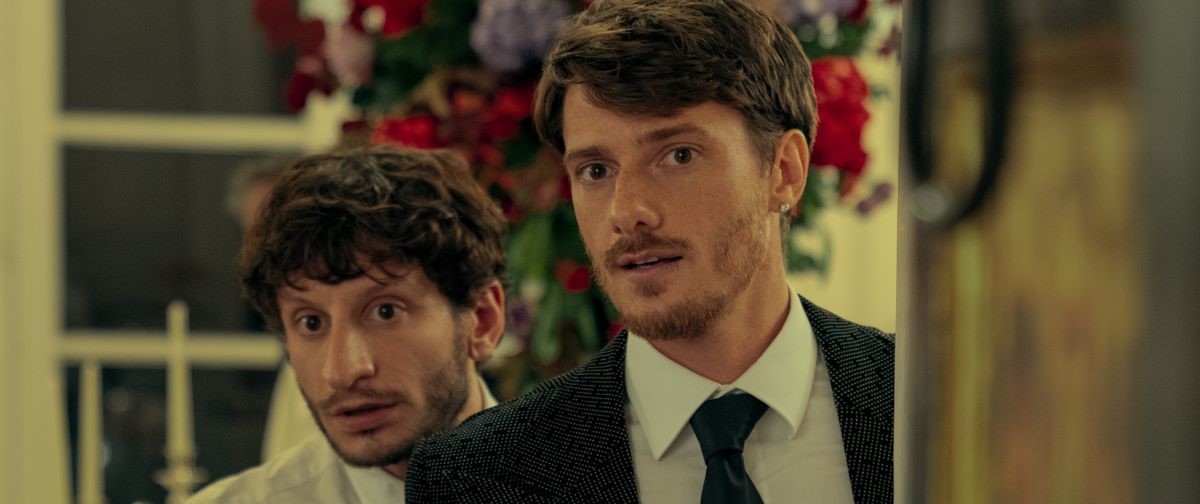Movie Reviews
Civil War Movie Review: Alex Garland Offers ‘Dystopian’ Future

Kirsten Dunst Courtesy of A24
Civil War earns 3 stars (out of 4) from Us Weekly movie critic Mara Reinstein.
Maybe it’s best to start with a rundown of what Civil War is not.
Despite the title, the ominous poster depicting the Statue of Liberty torch and the trailer in which Kirsten Dunst talks gravely about the need to go to Washington, D.C., this is not a political movie. It has no overt ties to the upcoming election. Writer-director Alex Garland (Men, Ex-Machina) never bothers to explain what the POTUS (Nick Offerman) exactly did to spur on a divided nation in which Texas and California are aligned.
Red states, blue states. Neither classification matters compared to the terrifying state of affairs.
Civil War is also not a movie that begs for repeated viewings. Forget about any twisty or open-to-interpretation ambiguity about all the intense violence. Garland, a London native, presents his grim cautionary tale loud and clear with every piercing gun shot. But that doesn’t mean this deeply absorbing dystopian vision of the future is easy to shake off.
So what are we dealing with here? An exploration of combat journalists languishing in a moral gray area in the name of their jobs. Dunst’s Lee Miller is a veteran and celebrated war photographer who shows scant emotion while bullets are flying at her in New York City. She just wants to tell a story with her camera. Now she and her work partner, a writer named Joel (Wagner Moura), want to go to the White House to interview the reclusive and embattled third-term president. As Joel reasons in a way-too-dubious declaration, “Interviewing him is the only story left.”

(L – R) Cailee Spaeny, Kirsten Dunst Courtesy of A24
Securing the sit-down will require traveling more than 800 miles via a beat-up white press van through active war zones and hostile territories guarded by merciless and heavily armed forces. On a personal level, Lee is also conflicted that a 23-year-old ambitious-but-green photographer (Priscilla star Cailee Spaeny) has wormed her way into the car. Her Jessie character is relegated to the back seat, along with a grizzled New York Times reporter (Stephen Henderson).
The group barrels through Pennsylvania, West Virginia and Virginia, where emotionally hollowed-out locals scrounge for food and water and resources. The suspense level at every stop is almost unbearably high. Each encounter with a stranger carries a whiff of doom: Filling up the tank with gas at a desolate station requires delicate dealmaking with its wary owners; a sunny twentysomething girl working behind the counter at an empty clothing boutique seems untrustworthy.
The optimism of spring is often contrasted with the stench of death. In one harrowing scene that underscores the madness, a sadistic soldier (an uncredited Jesse Plemons, i.e., Dunst’s husband) standing in the greenery murders bystanders with the disarming casualty of swatting away a fly. It’s such a quietly chilling experience that the ensuing chaotic violence at the White House feels numbing and anticlimactic by comparison.
Civil War can be frustrating in parts. War aside, Garland doesn’t have a clear POV about journalists who get a firsthand look at the horrors around them. Dunst portrays Lee as a jaded and stony professional, while Jessie is the wide-eyed idealist who vomits after a near-death trauma. They’re both heroes in their own way, yet neither quite captures the heart or the empathy when it matters the most.
The logic of their assignment — more like their mission — feels askew as well. Who and where is the audience for these risk-taking journalists? Working cellular service is long gone; nobody uses a phone or has regular access to the internet. The closest thing this movie comes to a laugh is when Moura makes a wry aside about “what’s left of The New York Times.” Dunst and Spaeny take many photos throughout the journey, complete with a distracting camera clickety-click sound effect. But do their images really make a lick of difference in this cynical reality?
There are no correct answers, of course. Because of the film’s narrow narrative scope and its single-focused characters, audiences must just digest the visual consequences of this civil war: Empty highways, residential lawlessness, an abandoned shopping center, cities literally under fire and a final cunning image that sears the soul.
None of the above makes for consumable entertainment — but, at this moment in time, it’s all disturbingly effective.
Civil War, which premiered at the SXSW Festival, opens in theaters Friday, April 12.

Continue Reading
Movie Reviews
'Cunk on Life' movie review: Laugh-out-loud mockumentary on life’s big questions

‘Cunk on Earth’ (2023), a mockumentary series on BBC, was hailed for its laugh-aloud mockery of pretentious documentaries and Morgan’s razor-sharp comedic timing — British droll at its very best.
Movie Reviews
The Love Scam movie review & film summary (2025) | Roger Ebert

Times are tough, even in the world of romantic comedies. In Umberto Carteni’s “The Love Scam,” two brothers in Naples face almost certain eviction just as Vito (Antonio Folletto) tries to secure solo custody of his son after his partner left for her home country. His brother, Antonello (Vincenzo Nemolato), a lovable but irresponsible goof, ignored bills that have now put their family’s old home in the hands of a wealthy developer. In an effort to stay in the home their grandfather built and not lose custody of Vito’s infant son Napoleon, the two men devise a scheme to woo the daughter of the developer, Marina (Laura Adriani), in order to pay off her father’s company with their own money–but only if Vito can transform into Carlo, a wealthy man-about-town looking for investors for his phony charity.
Mistaken identity and lying to impress a potential partner is a well-tread territory in the rom-com genre. For instance, Tom Hanks tries to hide his identity from Meg Ryan in their enemies-into-lovers internet-age classic “You’ve Got Mail.” James Stewart hid his identity even though he knew Margaret Sullavan was his long-suffering pen pal in the original 1940 film version of this beloved story, “The Shop Around the Corner.” Robert Downey Jr. pretends to be someone he’s not to spend time with Marisa Tomei in Rome in Norman Jewison’s “Only You.” Even in the Disney version of “Aladdin,” our hero pretends he’s a rich suitor to get close to his love interest, Jasmine, even though the opulent act isn’t what she’s really interested in. Although this familiar trope of courting by deception might inspire horror in any real-life situation, somehow it still works because they’re still making these kinds of movies. Maybe the reveal is so innocuously satisfying that the audience knows something one of the other characters doesn’t. Then, we watch our heroes make the right choices and fall in love despite the odds–at least until the credits roll.
Although “The Love Scam” follows these recognizable story beats, it ends up feeling deceptively charming thanks to its cast and crew. Writers Caterina Salvadori and Ciro Zecca manage to fit in a few surprises, overthrowing our expectations along the way to the anticipated ending. Director Carteni captures a nuanced view of Southern Italy, showing off its natural beauty, idyllic sunsets, and historic art and architecture, but also the struggles that some of Vito and Antonello’s neighbors endure as their home crumbles around them. Carteni leads a cast of endearing performers, all of whom work well together even when the narrative gets a little silly.
As Vito and Carlo, Folletto juggles the duties of two different personas with a few eccentric quirks and fatherhood duties in between. He acts so effortlessly, even when his character feels self-conscious; you can see Adriani’s Marina let her guard down in real-time. Their chemistry makes this movie memorable. Her character is flustered with expectations and stress, so to watch her grow from a frightening boss to a down-to-earth character who embraces life is a thrill, allowing Adriani to show off her range. I was less enamored by the storyline that Marina’s true dream was to become a chef over a businesswoman. While that fits with the genre’s sometimes more conservative gendered expectations, the writers incorporate it by giving Vito the night cleaning shift at a restaurant he then tries to pass off as his own to entice her to cook with him, so it feels less like a lesson in returning to domesticity. Although they feature heavily in the beginning, Vito’s brother Antonello and Napoleon step aside when Carlo begins to win over Marina’s attention. Still, the odd pairing of an ill-equipped uncle and adorable baby makes for some good jokes. In addition to Marina’s initial no-nonsense personality, her suspicious boyfriend Federico (Loris De Luna) is the power-hungry foil to Folletto’s kindhearted, would-be scammer. It gives him something of an invisible enemy to fight for Marina’s love.
While “The Love Scam” isn’t breaking new rom-com ground, it sufficiently checks the expected boxes and features a formidable romantic pair with Folletto and Adriani. The scam-within-a-scam house of cards narrative is just scaffolding for the movie’s real stars. Although many recent romantic movies also use cutesy gimmicks for their backdrop, their leads lack the heat to deliver something resembling a believable yet expected happy ending. In “The Love Scam,” there are scenes where Vito longingly looks at Marina in such a way that we understand why she would give this stranger the time of day, why they bring out the best in each other, and why we want to keep watching to see what happens to them, even if we kind of already know where their story is headed. Adding just a dash more sincerity than your average streaming romantic movie goes a long way.
On Netflix now.
Movie Reviews
‘Baby John’ Review: Varun Dhawan in a Flashy, Twisty, Exhaustingly Extravagant Hindi Actioner

At one point in Baby John, a little girl named Khushi (Zara Zyanna) hides under a bed, screaming with fear. Outside, bad guys are pulverizing her caretakers. She can hear the mayhem and anticipate that bad things are coming her way.
The scene made me wonder why her father, the titular Baby John (Varun Dhawan), hadn’t trained her the way that Honey instructs her young daughter Nadia in Citadel: Honey Bunny, also starring Dhawan as Nadia’s father. Nadia is such a pro at dealing with murderous attacks that when one takes place, Honey just tucks her into a trunk, puts headphones on her ears and tells her to listen to the song and not come out.
Baby John
The Bottom Line Relentless and joyless.
Release date: Wednesday, Dec. 25
Cast: Varun Dhawan, Keerthy Suresh, Jackie Shroff, Wamiqa Gabbi, Rajpal Yadav
Director: Kalees
Screenwriters: Kalees, Atlee, Sumit Arora
2 hours 44 minutes
Incidentally, both Nadia and Khushi belong to a club particular within Indian cinema — that of overtly precocious kids who speak like adults. (I think of the cancer-stricken Sexy from Cheeni Kum as the president of this club.) While it’s meant to be endearing and cute, it often comes off as annoying and manipulative.
All of this is to say that Baby John is the sort of film that pummels you with star power (including a Salman Khan cameo), extravagant visuals, ear-bleeding sound, fantastically gaudy songs and a story that twists and turns with flashbacks, double identities and assorted villains, but despite all that flash fails to hold you. At 161 minutes, it gives you plenty of headspace to wander down rabbit holes and make random associations — like that between Khushi and Nadia.
This was not the case with the source material. Atlee’s 2016 blockbuster Theri was named after the Tamil word for “sparkle,” and it had plenty of it. The director’s signature combination of action, emotion and social commentary worked seamlessly. Leading man Vijay, playing DCP A. Vijay Kumar and his nonviolent alter ego Joseph Kuruvilla, was very much the slick superhero who walks in and out of frame in slow motion, but he could also cry and be tender. In Baby John, Atlee (who serves as producer along with his wife, Priya Atlee) infuses his narrative with steroids. The Hindi remake is bigger and louder, but not necessarily better.
During the promotional campaign for Baby John, we were told to remember that it would be a “Christ-Mass release” — meaning that this would be a mass commercial entertainer, or what director Prashanth Neel refers to as “anti-gravity cinema,” in which coherence, logic and the rules of physics do not apply. What is necessary is delivering what Atlee calls a “stadium moment,” that sense of collective euphoria in a theater. This is a difficult and delicate art of which Atlee is an expert; just recall Captain Vikram Rathore’s entry in Jawan.
Writer-director Kalees isn’t able to deliver these cinematic highs with the same panache, mostly because he strains too hard to create them. Each beat is underlined by music or dialogue, and exaggeration is the default mode. So Dhawan, who has delivered in features as diverse as Dishoom and October, gets multiple moments with the full hero treatment: slow motion, low angles, shades that are removed or thrown on to emphasize swag, action sequences in which he flies and kills without breaking a sweat. But in all of this, the filmmakers forget to make Satya/John distinctive or memorable.
The movie treats the cop avatar with reverence and valorizes police brutality. Satya goes on a murdering spree, torturing and castrating and burning a man alive, but his actions are presented as justified because the men he murders do terrible things — mostly to women, who serve as disposable fodder for violence. Female characters are shot, punched, raped, burnt, trafficked. At various points, young girls are smuggled in containers and even in animal carcasses. All of which only makes the hero look more heroic. In one scene, he is referred to as desh ki ladkiyon ka rakhwala, or protector of Indian women.
Kalees also insists on making the villain larger than life. In Theri, Mahendran gave an effective performance as a corrupt minister who destroys Vijay’s life. He was evil without any additional flourishes. Here, Jackie Shroff has a ball playing Babbar Sher, whose signature move is lounging in a traditional Kerala easy chair which he likes so much that he even carries it to a shipping dock for the climactic showdown. But although Shroff brings a compelling menace, I lost track beyond a certain point of Babbar’s many nefarious activities, and how often and why he is in jail.
(As an aside, can filmmakers find other locations for action? This year, we’ve seen shipping docks as backdrop now in Devara: Part 1, Pushpa 2: The Rule, Singham Again and Yudhra.)
More than anything, Baby John is a showcase for Dhawan, who gets to be the quintessential masala hero. He gets to romance, to be a doting father and a loving son, to do some seriously aerobic dancing and, of course, to fight. At one point, he does a somersault on top of a horse. Appearing in nearly in every frame, he goes at it with a ferocious sincerity. Dhawan’s father, David Dhawan, was a master of masala entertainers, and there is some pleasure in watching the son act his mass-loving heart out. But little sticks because the knotty plot switches from romance to action to abducted girls to flashback so abruptly that it gives you whiplash and glazed eyes.
The two leading ladies — Keerthy Suresh, who makes her Hindi debut, and Wamiqa Gabbi, who makes her mass film debut — don’t get enough to do. Both are fine actors but to see their talent, you’ll have to look elsewhere. I recommend the Telugu picture Mahanati for Suresh and the series Jubilee for Gabbi.
Baby John is relentless and joyless. Christmas needed better mass.
-

 Business1 week ago
Business1 week agoOn a quest for global domination, Chinese EV makers are upending Thailand's auto industry
-

 Health6 days ago
Health6 days agoNew Year life lessons from country star: 'Never forget where you came from'
-
/cdn.vox-cdn.com/uploads/chorus_asset/file/24982514/Quest_3_dock.jpg)
/cdn.vox-cdn.com/uploads/chorus_asset/file/24982514/Quest_3_dock.jpg) Technology6 days ago
Technology6 days agoMeta’s ‘software update issue’ has been breaking Quest headsets for weeks
-

 Business3 days ago
Business3 days agoThese are the top 7 issues facing the struggling restaurant industry in 2025
-

 Politics1 week ago
Politics1 week ago'Politics is bad for business.' Why Disney's Bob Iger is trying to avoid hot buttons
-

 Culture3 days ago
Culture3 days agoThe 25 worst losses in college football history, including Baylor’s 2024 entry at Colorado
-

 News1 week ago
News1 week agoAmerican Airlines lifts ground stop that froze Christmas Eve travelers
-

 World1 week ago
World1 week agoWho is Europe's top investor in space in 2023?




















